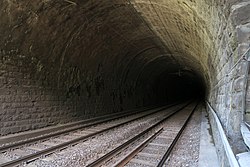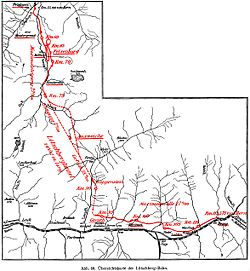Lötschberg Tunnel
 The Lötschberg Tunnel from the north portal | |
| Overview | |
|---|---|
| Official name | German: Lötschberg Tunnel |
| Line | Lötschberg Line |
| Location | Circumventing the Lötschen Pass in the Bernese Alps in Switzerland (Canton of Bern, canton of Valais) |
| Coordinates | 46°22′08″N 7°45′14″E / 46.369°N 7.754°E – 46°28′41″N 7°40′01″E / 46.478°N 7.667°E |
| System | BLS, SBB CFF FFS |
| Start | Kandersteg, canton of Bern, 1,200 m (3,900 ft) |
| End | Goppenstein, canton of Valais, 1,216 m (3,990 ft) |
| Operation | |
| Work begun | 7 March 1907 |
| Opened | 15 July 1913 |
| Owner | BLS NETZ AG |
| Operator | BLS |
| Traffic | Railway |
| Character | Passenger, Freight, Car Transport |
| Technical | |
| Length | 14.612 km (9.079 mi) |
| No. of tracks | One double-track |
| Track gauge | 1,435 mm (4 ft 8+1⁄2 in) (standard gauge) |
| Electrified | 15 kV 16.7 Hz |
| Highest elevation | 1,239.54 m (4,066.7 ft) |
| Lowest elevation | 1,200 m (3,900 ft) (north portal) |
| Grade | 3–7 ‰ |
| Route map | |

The Lötschberg Tunnel is a 14.61 km (9.08 mi) long railway tunnel on the Lötschberg Line, which connects Spiez and Brig at the northern end of the Simplon Tunnel cutting through the Bernese Alps of Switzerland. Its ends are at the towns of Kandersteg (2 km away) in the canton of Bern and Goppenstein in the canton of Valais.[2] The top elevation of the tunnel is 1,240 m (4,070 ft) above sea level, this is the highest point of the main Swiss railway network.
Construction began in 1907 and suffered delays by several severe accidents.
- February 1908: An avalanche destroyed a hotel that the workers lived in, killing 13.
- July 1908: The tunnel broke into a deep fissure below the Gasterntal valley and flooded with water and glacial deposit from the fissure, killing 25, and 1554 meters (5100 feet, 0.9656 mile) of the tunnel had to be abandoned and sealed off and replaced by a curved bypass.
- March 1911: Breakthrough was achieved
- 3 June 1913: Finalization
- 15 July 1913: Regular service through the Lötschberg Tunnel began in 1913.
The tunnel is a single bore twin track.
The BLS AG company offers a car transport service through the tunnel, between Kandersteg station and Goppenstein station, for accompanied vehicles. The journey time of approximately 20 minutes, passengers remain in their cars in open sided car transport vehicles. At peak times, the car transport service operates in each direction every 7½ minutes.
The new Lötschberg Base Tunnel, opened on June 15, 2007, has been constructed some 400 m (1,312 ft) below the level of the current Lötschberg Tunnel as part of the NRLA (New Railway Link through the Alps) project.
 |
 |
 |
See also
[edit]References
[edit]- ^ Röll, V. Freiherr von: Enzyklopädie des Eisenbahnwesens, Band 2. Berlin, Wien 1912, p. 256 on www.zeno.org/Roell-1912
- ^ Eisenbahnatlas Schweiz. Verlag Schweers + Wall GmbH. 2012. p. 45. ISBN 978-3-89494-130-7.
Further reading
[edit]- Baumgartner, B., and M. Lortscher. 2007. "Commissioning of the Lotschberg Base Tunnel". Elektrische Bahnen; Zentralblatt F̐ưur Elektrischen Zugbetrieb Und Alle Arten Von Triebfahrzeugen Mit Elektrischem Antrieb. no. 6: 345-350.
- Lortscher, M., et al. "Electric Installations in the Lotschberg Base Tunnel." Elektrische Bahnen; Zentralblatt F̐ưur Elektrischen Zugbetrieb Und Alle Arten Von Triebfahrzeugen Mit Elektrischem Antrieb. 6 (2007): 323-344.
- Pesendorfer, M., and S. Loew. 2004. "Hydrogeologic Exploration During Excavation of the Lotschberg Base Tunnel (AlpTransit Switzerland)". Lecture Notes in Earth Sciences. no. 104: 347-358.
- Vuilleumier, F., A. Weatherill, and B. Crausaz. 2002. "Safety Aspects of Railway and Road Tunnel: Example of the Lotschberg Railway Tunnel and Mont-Blanc Road Tunnel". Tunnelling and Underground Space Technology. 17, no. 2: 153-158.
- 2000. "Lötschberg Base Tunnel Will Open Up Low-Level High-Cube Route in 2007". Railway Gazette International. 156: 175-182.
- 2002. "TUNNELS - Lotschberg Team Advances Swiftly Through the Alps - Teams Using TBMs and Drill-and-Blast Methods Drive Tunnel That Will Speed Trucks Through Switzerland". ENR.. 249, no. 3: 28.
- 2005. "Tracklaying Reaches Halfway in the Lötschberg Base Tunnel". Railway Gazette International. 161, no. 12: 773-775.
External links
[edit]![]() Media related to Lötschberg rail Tunnel at Wikimedia Commons
Media related to Lötschberg rail Tunnel at Wikimedia Commons
